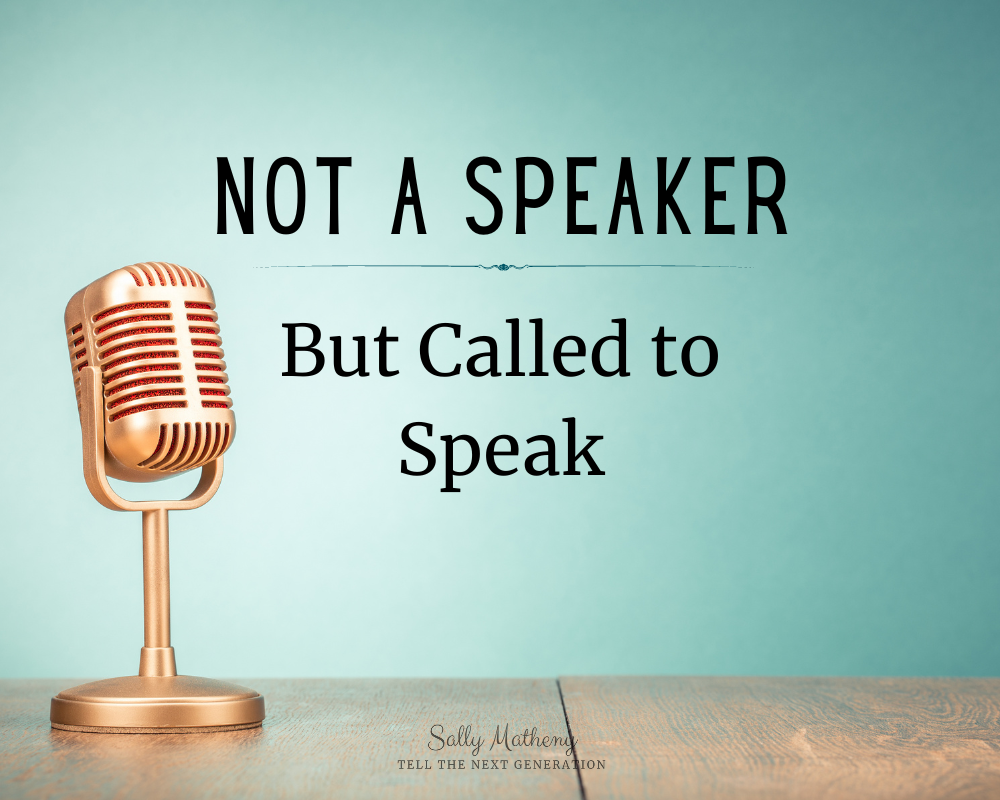
Not a Speaker But Called to Speak
What do you do when you’re not a speaker but someone has called asking you to speak? Perhaps you’ve been asked to speak to a group of three hundred, or thirty, or just three.
If your first thought is to decline because you’re scheduled to scrub toilets that day, then this post is for you.
I’m writing this post as a reminder to myself as well. Often, when I’m invited to speak, there’s a sense of excitement, but also a little fear. It emerges to point out once again: you are not a professionally trained speaker.
So, why have I kept the title of my Facebook Page: “Sally Matheny –Encourager, Writer, Speaker”? Because every time (and there have been many) I consider removing the “Speaker” part, I cannot bring myself to do it. God reminds me of my mission statement. I encourage others to tell the next generation wondrous things using the power of story, history, and His Story. It’s what continually surges in my heart. So, I keep pressing forward, asking God to help me tame my fears as I go.
Have you recently received your first invitation to speak? Or, maybe you’re like me and you’ve done public speaking before. But, due to the pandemonium of recent years, you’ve not spoken in a while. Our presentation skills feel rusty from lack of use. We’re thinking we may have speaker lockjaw settling in.
Why Do We Get So Nervous About Public Speaking?
It boils down to fear. Fear of inadequacy, fear of failure, fear of rejection.
Devote some time to assess these fears. Where have we picked them up? Are they justified, or are we just using them to rationalize our settling for something less?
“I want to speak about the importance of this, but . . . “
“I think someone might find this helpful, but . . .”
“I’d like to share how this changed my life, but . . .”
Seems like we have a lot of “buts” standing in our way! But, due to our fears, we dodge, defer, and suggest delegating the speaking to someone else.
There’s a TEDx talk by Michael and Amy Port. Michael, the co-founder and CEO of Heroic Public Speaking said this:
“When you think that you have to protect yourself from getting hurt, it seems like all you’ve really done is silenced your voice.”
We may have a sincere desire to help others. But, do our fears reveal we have a greater focus on ourselves? Ouch.
I once told a friend up north that when I speak to folks outside of my region, I’m self-conscious of my Southern American English (a.k.a. Southern accent). My friend didn’t soothe me by saying how much she liked my drawl. Neither did she urge me to try speaking with an Irish accent.
With all seriousness, she flatly stated, “Nobody cares.” She wasn’t being rude. The point was people care more about what you’re saying than the dialect you’re using to say it.
Even so, I’m still working on making the word “get” rhyme with set, instead of sit. (grin) Becasue some things can be so confusing, or distracting, that listeners miss what’s important. But, otherwise, I’m embracing my Southern roots. And sing-songy twang.
What is Important
Just before speaking to a group, if I feel my heart jitterbugging with my stomach, I remind myself that the message I want to share is more important than my fears.
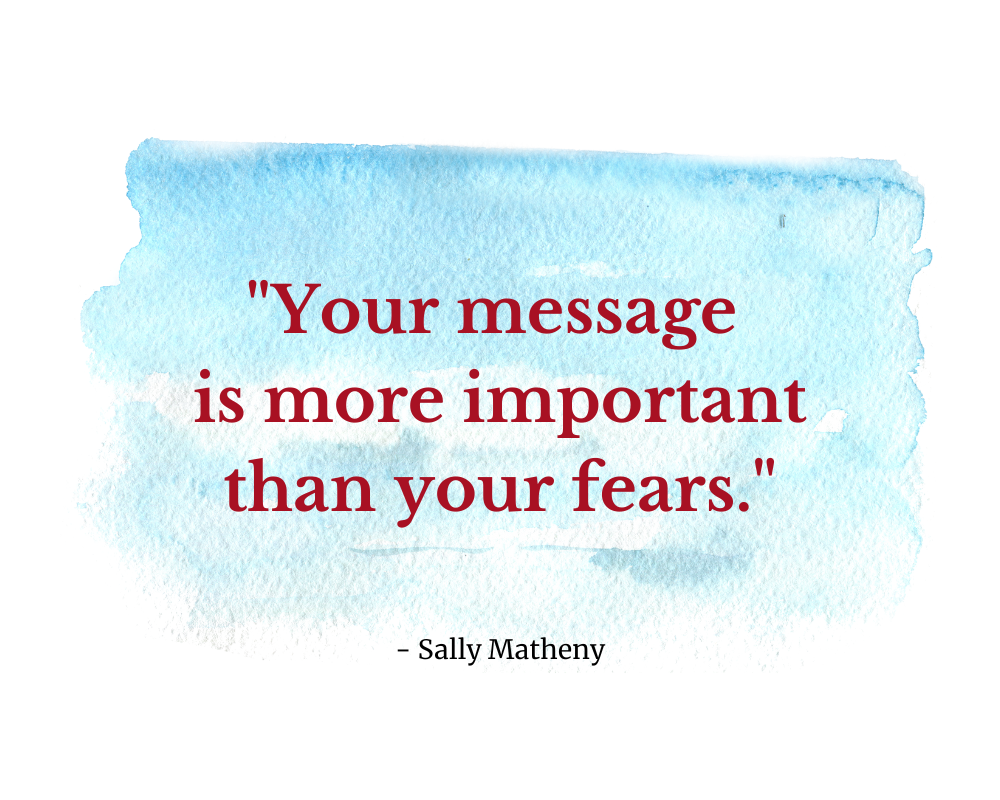
When you feel nervous about public speaking ask yourself, “Why do I want to speak to these people?”
If your goal is to share something dear to your heart and you think it will add value to the lives of others, then I’m here to encourage you. Be brave. Step up to the mic.
Even if you expect a small audience, the same fears may bubble up—fears of inadequacy, failure, rejection. Fear is not entirely a bad thing. It keeps us humble and dependent upon the wisdom and strength of our Lord.
Before We Speak
After we evaluate what makes us nervous about public speaking, then, not only do we need to pray and trust God for His help, but we need to be willing to do our part.
Putting in the time to research our topic well is essential. Do we believe what we’re saying? If not, then we certainly don’t need to speak about it.
Writing out what we want to say is helpful. But, writing and speaking are two different things. In some instances, there is no time to thoughtfully prepare a speech. When we’re caught by surprise, we may stammer around a bit trying to collect our thoughts. One deep breath is all it takes to silently utter, “Help me, Lord.”
But, even in circumstances where we’ve had time to prepare, we may be tempted to read our speech from the beginning to the end. We think our papers are security blankets. But, our fears will seize the moment if we put a death-grip on those documents. When delivering a speech, we need to remember that our notes serve as the guardrails, not the vehicles.
We must recall our why. Why are we passionate to share our message with others? Hold onto that sincere enthusiasm. It will outshine the fears.
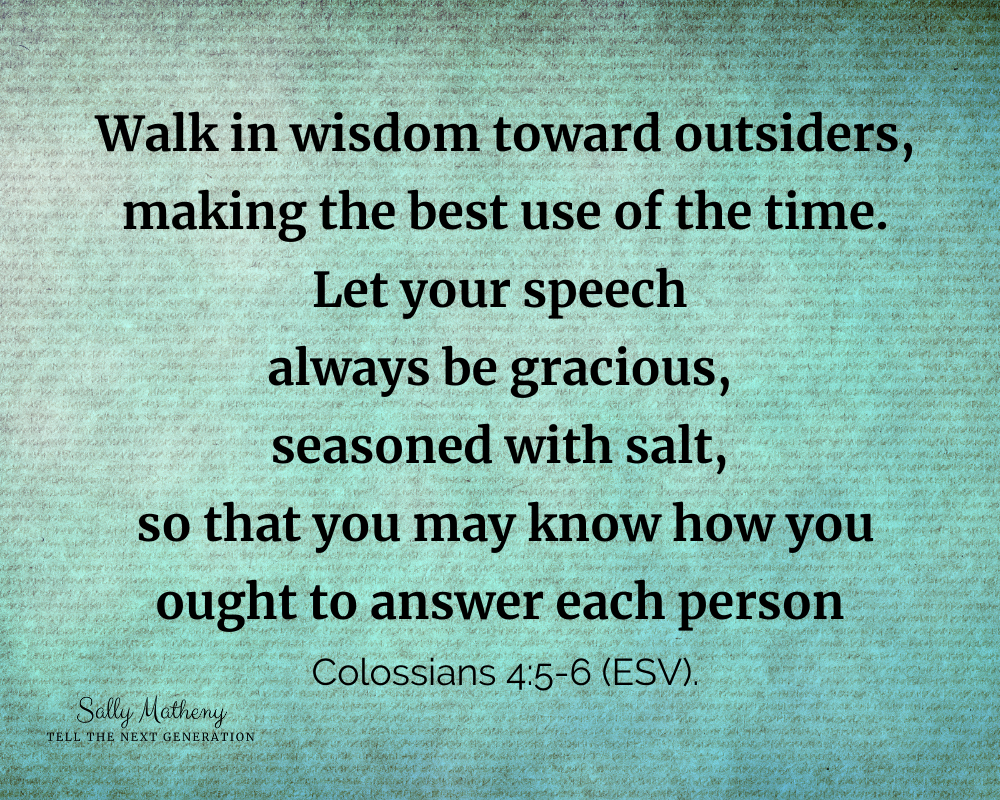
One Vital Element of Becoming a Better Speaker
I’m sure the best speakers out there improved their speaking skills by giving speech after speech, after speech. And, yes, many of them battled fears along the way. After becoming expert presenters, some of them have shared what they’ve learned along the way.
Oodles of excellent resources on public speaking are available for us. We can watch helpful videos, listen to pocasts, and read in-depth books and instructional articles.
However, none of those will help us share the valuable messages we have for people if we don’t do one vital thing.
When we’re called to speak, we must say, “Yes.”
For more encouragement, check under the “Resources” tab for the free download Scriptures to Study Before Speaking. If it’s no longer available there, just contact me and I’ll send it to you.
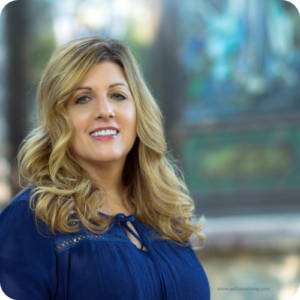
Sally Matheny believes deep inside of us there’s a desire to tell the next generation something of true value, something life-changing, something to which they’ll cling to for the rest of their lives. Her passion is encouraging families through the power of story, history, and His Story.
In addition to culling from current events, Sally also curates fascinating facts from the past. Then, she polishes those discoveries into stories that entertain, educate, and inspire. Her writing appears in worldwide, national, regional, online and print publications.
She and her husband live in the foothills of the Blue Ridge Mountains and are blessed with three children and armfuls of grandblessings.



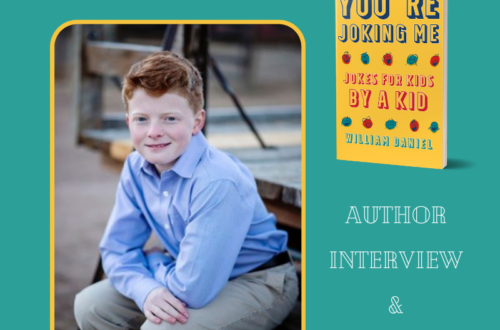
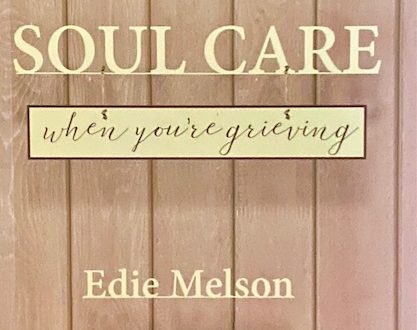
2 Comments
Gayle Veitenheimer
Great word, Sally.
J.D. Wininger
Do we Forget Everything And Run or do we Face Everything And Rise? Fear is often the driving force behind both good and bad decisions. The difference is found in who we’re doing it for. If ourselves, then fear wins. If God, and we care called to it by God, then the glory will be His. Such an encouraging post ma’am.